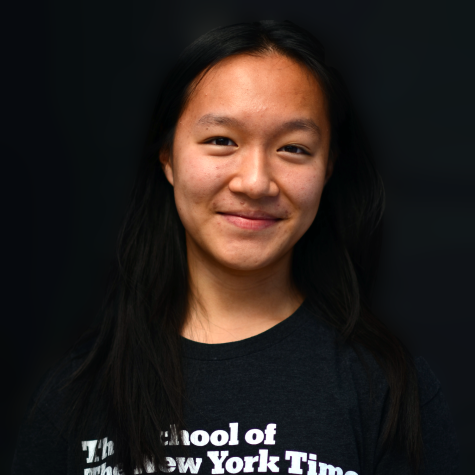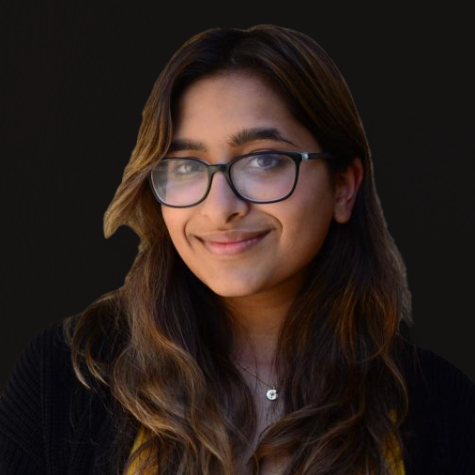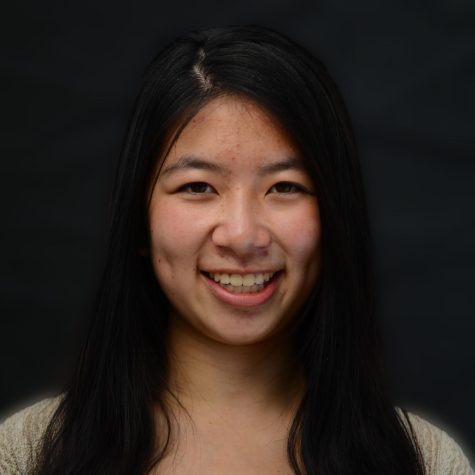Humans of Harker: For the future and the present
Brian Pinkston strives to create a more accepting community
It’s been obviously rough, turning on the news and seeing another death, seeing another acquittal every single time … but, ‘How much can I do?’ is the question I’m asking myself. ‘How much can I help, and what impact can I have?’” Brian Pinkston (’21) said.
Walking up to a bookshelf populated by dozens of novels ranging from Ray Bradbury to Langston Hughes, Brian Pinkston (‘21) runs his fingers along the titles until finally settling upon a copy of the film “I Am Not Your Negro.” The visual essay, which explored James Baldwin’s unfinished novel that discussed the continuing history of racism in America, is one of many pieces of art that has shaped Brian as an activist today. After picking up To Kill a Mockingbird in elementary school, Brian realized the impact and relevance that novels have on the world.
“I love to read. I’m reading a few James Baldwin books right now. He’s my favorite author. From a really young age, I started to learn how much information was within books. It’s a stack of 250 to 300 pages, but there’s so much information on the world,” Brian said. “Going through a lot of [James Baldwin’s work] really helped shape how I saw activism and how I saw my place in the world.”
As he got older, Brian began noting more and more recurring racist incidents at Harker. His classmates would pass off racist speech and fighting words as jokes, making hateful meme pages and stereotyping him.
“I noticed there’s no support system in place to actually deal with these [incidents], so I decided to go to the administration and create some myself so that future students wouldn’t have to go through the same thing,” Brian said. “I really saw a problem of lack of knowledge, information [and] material surrounding this, so I decided to change it.”
Learning from the books that he’s read, Brian decided to take action and form the Student Diversity Coalition with Natasha Yen (‘21) and Uma Iyer (12). He relayed his own stories as one of the only Black students at Harker, and his ideas for how to make Harker a more accepting space.
“When I met with the Diversity Committee, and I met with students who had gone to the [Student Diversity Leadership Conference] the previous year, I told them my story, and I got to see who they were and how this involved them,” Brian said. “That was the beginning of our ideas for the SDC, and that was really defining for me, showing me how much I could do if I worked with people I knew and used my resources.”
As a founding member of the coalition, Brian hopes to see more students strive to further the legacy that he’s left. He stresses the importance of an intertwined community of compassionate and educated students and faculty at Harker.
“I’m probably not going to see the cultural shift pay off from SDC for a while, but I’m really hoping that five years or six years down the road, or even next year, someone else will be able to take charge, implementing everything all the way throughout the lower school all the way up to the upper school,” Brian said. “I want a [community] of global citizens, where jokes are called out because they’re more than jokes. Your jokes are someone else’s reality, someone else’s struggles, someone else’s pain.”
Brian’s friends all admire his compassionate nature and kind demeanour. Close friend Callie Mayer (12) notes how his empathy helps further him as an activist.
“What he does is really admirable and it ties into how empathetic and how thoughtful of a person he is because he is able to see other people’s concerns and needs rly clearly and he is always tending to the needs of other people,” Callie said. “He always makes sure that everybody around him is happy. That ties into the work that he does with SDC and also outside of school because he’s able to see things so clearly and in a certain way where he is able to work towards them with compassion.”
Through his own experiences at Harker, Brian realizes that this racism stems from ignorance.
“I would say part of it is how sheltered we are. Part of it is also it being normalized, not knowing any Black people, aside from me,” Brian said. “That limited exposure, not knowing any diversity, really led them to believe that, ‘Oh, it’s okay. It happens sometimes.’”
Brian knows that evidently, many of these bigotted incidents occur in private with friends or under the safety of anonymity online. Regardless, he urges people to speak up and shut down hateful speech.
“Even if someone’s making a joke about someone that’s not in the room, speak out about it,” Brian said. “I know a lot of closed door conversations happen more frequently, so I would encourage people to speak out about that, even if someone’s not part of the group, still say something about it, and let them know that’s not okay.”
Starting this conversation was not easy for Brian and his teammates. In starting the Student Diversity Coalition, he had to work for hours on end, communicating closely with administrators and other students. The workload was strenuous, but even more difficult was Brian’s journey to acknowledge and understand the racism that he’s faced in the past.
“I really buried a lot of it until the summer when I could really unpack and think about what happened,” Brian said.
That summer, Brian spent much of his time reading and researching. He read novels about past civil rights movements in the world, online articles about current racist policies in America and biographies by Black authors.
“Looking at past movements and how effective they’ve been, what’s happened both on a local level and the national and international level, I can see which were the most effective techniques, what tactics that they used, how they accomplished this,” Brian said.
Volleyball has also helped him in his goal to achieve a unified community. Having played with a club team for around three years, Brian finds that having relationships outside of school can help him grow.
“As I began to know the sport more, I got to see how much of a team people can become. Getting to know 12 guys really close, being able to see people who know me outside of school, that really let me build the relationship and have people that I could go to that weren’t inside of school,” Brian said.
Brian has used both past experiences and observations to educate not only others, but himself as well. Ultimately, his work is nowhere near its end, and he strives to continue to work towards building an equitable and safe world for minorities.
“It’s been obviously rough turning on the news and seeing another death, seeing another acquittal every single time, but, ‘How much can I do?’ is the question I’m asking myself. ‘How much can I help? What impact can I have?’” Brian said.

Erica Cai (12) is the co-editor-in-chief of Humans of Harker, and this is her fourth year on staff. Her goals in journalism this year are to celebrate...

Esha Gohil (12) is the co-editor-in-chief of Humans of Harker and the photo editor of Harker Aquila. This is her fourth year on staff, and this year she...

Irene Yuan (12) is the co-managing editor of Harker Aquila with a focus on multimedia and social media. This is her fourth year on staff, and she hopes...


















![“[Building nerf blasters] became this outlet of creativity for me that hasn't been matched by anything else. The process [of] making a build complete to your desire is such a painstakingly difficult process, but I've had to learn from [the skills needed from] soldering to proper painting. There's so many different options for everything, if you think about it, it exists. The best part is [that] if it doesn't exist, you can build it yourself," Ishaan Parate said.](https://harkeraquila.com/wp-content/uploads/2022/08/DSC_8149-900x604.jpg)




![“When I came into high school, I was ready to be a follower. But DECA was a game changer for me. It helped me overcome my fear of public speaking, and it's played such a major role in who I've become today. To be able to successfully lead a chapter of 150 students, an officer team and be one of the upperclassmen I once really admired is something I'm [really] proud of,” Anvitha Tummala ('21) said.](https://harkeraquila.com/wp-content/uploads/2021/07/Screen-Shot-2021-07-25-at-9.50.05-AM-900x594.png)







![“I think getting up in the morning and having a sense of purpose [is exciting]. I think without a certain amount of drive, life is kind of obsolete and mundane, and I think having that every single day is what makes each day unique and kind of makes life exciting,” Neymika Jain (12) said.](https://harkeraquila.com/wp-content/uploads/2017/06/Screen-Shot-2017-06-03-at-4.54.16-PM.png)








![“My slogan is ‘slow feet, don’t eat, and I’m hungry.’ You need to run fast to get where you are–you aren't going to get those championships if you aren't fast,” Angel Cervantes (12) said. “I want to do well in school on my tests and in track and win championships for my team. I live by that, [and] I can do that anywhere: in the classroom or on the field.”](https://harkeraquila.com/wp-content/uploads/2018/06/DSC5146-900x601.jpg)
![“[Volleyball has] taught me how to fall correctly, and another thing it taught is that you don’t have to be the best at something to be good at it. If you just hit the ball in a smart way, then it still scores points and you’re good at it. You could be a background player and still make a much bigger impact on the team than you would think,” Anya Gert (’20) said.](https://harkeraquila.com/wp-content/uploads/2020/06/AnnaGert_JinTuan_HoHPhotoEdited-600x900.jpeg)

![“I'm not nearly there yet, but [my confidence has] definitely been getting better since I was pretty shy and timid coming into Harker my freshman year. I know that there's a lot of people that are really confident in what they do, and I really admire them. Everyone's so driven and that has really pushed me to kind of try to find my own place in high school and be more confident,” Alyssa Huang (’20) said.](https://harkeraquila.com/wp-content/uploads/2020/06/AlyssaHuang_EmilyChen_HoHPhoto-900x749.jpeg)



Susan Nace • Aug 3, 2021 at 1:45 pm
Thank you, for the wonderful story, and thank you, Brian! We are blessed to have you at Harker and blessed by your work with us!